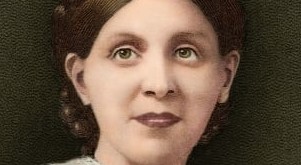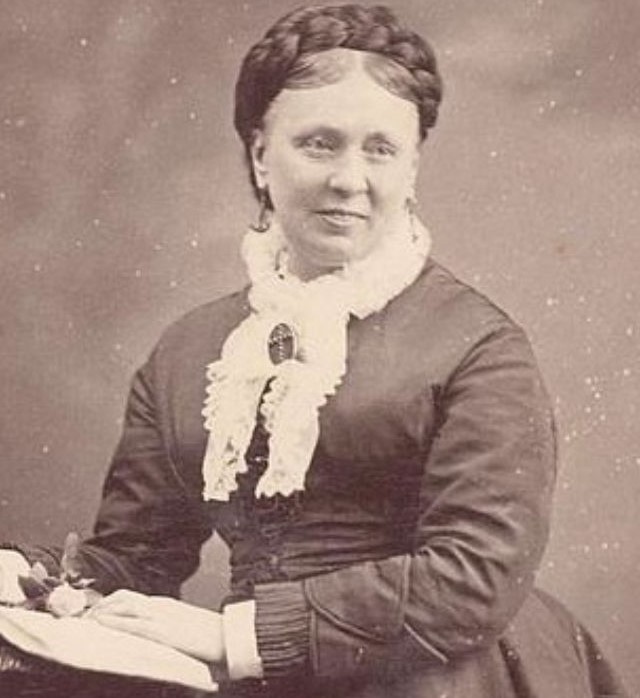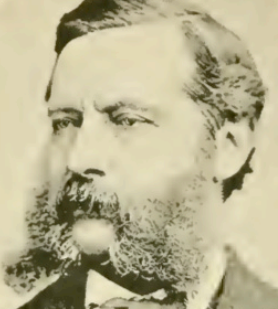Emma Hardinge Britten (1823–1899), despite her lack of education and family financial support, was at different times a ‘musician, actor, writer, theologian, political activist, magazine publisher, spirit medium, lecturer, Spiritualist missionary, and self-described witch’.1Howe (2015), 1. She was and is best known for her advocacy of the burgeoning Spiritualism movement in the late nineteenth century.
Life
Emma Hardinge Britten was born Emma Floyd on 2 May 1823 in Bethnal Green, a parish near London. She was the eldest surviving child of Anne Sophia Bloomfield and Ebenezer Floyd, whose occupation is variously given as mariner, schoolmaster and apothecary (so he might have been all three).2Demarest (2011). All information in this section is drawn from this source except where otherwise noted. How she acquired the middle name Hardinge is unknown: possibly it was a stage name, though some hypothesize that she had a brief unsuccessful first marriage. As a child Emma showed great musical talent. By her own account, she also demonstrated mediumistic and precognitive abilities.3Britten (1900).
Ebenezer Floyd died in 1934 after the family had moved to Bristol. Aged eleven, to support her mother and two surviving siblings, Emma began earning money by teaching music and performing as a singer and pianist; her public debut was reported in the Bristol Mercury on 29 November 1838. As a teen she also published music under a male pseudonym. In 1840, sent to London to build her career under an impresario, she became involved with a group of occultists known as the ‘Orphic Circle’, who used children as ‘clairvoyants and somnambulists’4Howe (2015), 3. and were likely a strong influence. By the age of nineteen she had become an actor, performing at the Covent Garden, Sadler Wells and Adelphi Theatres, and in Paris.
Invited to perform on Broadway, in 1855 Britten travelled to New York with her mother and remained in America for ten years. During this time she joined the rapidly-growing Spiritualist movement, launched by the Fox Sisters in New York state. Britten shifted the locus of her work from stage to lecture podium and séance table, travelling all over the United States for appearances and sittings. By her own account, this was at the behest of insistent guiding spirits.5Britten (1900), 45. She edited a periodical, staged a Spiritualist concert and produced a collection of short stories. She also became involved in politics as an advocate for abolition of slavery, women’s rights and other reforms, and was a campaigner, then eulogist, for Abraham Lincoln.6Howe (2015), 5.
In 1865 she returned to England to spread the Spiritualist word there, making a strong impression; as author James Robertson recounted, ‘Literary persons like William Howitt were amazed at the sweet grace of diction, the continual flow of lofty and inspiring thought given forth without preparation or effort’.7Robertson (1908), 320. For the rest of her life she would alternate between the UK and the USA in her lecturing work, with forays into Canada, Australia and New Zealand.
Britten began to come into her own as a Spiritualist writer in the late 1860s; previous to this, most of her published works were transcribed lectures. Her ‘Rules For The Formation And Conduct Of Spirit Circles’ (see Works below), published in the UK in 1868, is her most-often-reproduced text on both sides of the Atlantic, according to biographer Marc Demarest. Her first major published work was a 565-page history of American Spiritualism and Spiritualist polemic published in 1870, Modern American Spiritualism: A Twenty Years Record Of The Communion Between Earth And The World Of Spirits. She went on to write several more instructional works, including more on how to conduct sittings and sustain spirit circles, and how to investigate spiritual manifestations. With Alfred Kitson and HA Kersey she co-authored The Lyceum Manual: A Compendium Of Physical, Moral, And Spiritual Exercises For Use In Progressive Lyceums Connected With British Spiritualist Societies, whose seventeenth revised edition was published in 1992.
In 1870, Emma Hardinge married the man who would join her in her Spiritualist efforts for the rest of his life, William Godwin Britten. Like her, he was originally from England, specifically London, and an ardent Spiritualist. On the marriage record he gave his occupation as ‘lecturer’. The couple experimented with electricity as a method of healing and in fact opened a practice, resulting in Emma publishing about it. They also put out a publication entitled The Western Star, which ran until its office was forced shut by the Great Fire of Boston in 1872.8Howe (2015). Britten describes the Great Fire of Boston vividly in her autobiography. With works such as Ghost Land; or, Researches into the Mysteries of Occultism, Emma’s writing turned more to practical occult techniques. In 1875 she collaborated with HP Blavatsky in the founding of the Theosophical Society, but rivalry between the two ended the relationship.
After a last long missionary trip, first to California and then to Australia and New Zealand in 1878 and 1879, the Brittens moved to Manchester, England and remained there for the rest of their lives. Emma continued lecturing closer to home, and edited two publications (Two Worlds and Unseen Universe). She continued to write up until her death, including an autobiography that was published posthumously. William died in 1894 and Emma on 2 October 1899, aged 76.
Biographies
Britten has drawn the interest of many biographers, celebrated as a Victorian ‘smart woman’ who transcended the constraints imposed by sex and class to become a high-profile leader of a movement toward a spiritual/intellectual revolution.
Notable biographers are Lisa Howe, whose doctoral thesis on Britten’s life contextualized in her era and its existing culture and religion,9Howe (2015). and Marc Demarest, curator of a comprehensive website on Britten (see below); his biography is lavishly illustrated with source reproductions.10Demarest (2011).
Her autobiography was compiled from her diaries and published by her sister Margaret Wilkinson in 1900. Demarest notes, the book is not without flaws: ‘She didn’t tell whoppers, but she did prevaricate, shape, and elide.’11Demarest (2011), 146.
Legacy
Demarest writes that Emma Britten ‘was all about replacing what she saw as a repressive, destructive Christian tradition with a new religion, premised on the survival of personality after death, and perfectibility – a scientific (as she saw it) faith’.12Demarest (2011), 150.
While Spiritualism’s heyday is long past, it continues to exist as a religious denomination in the UK and the USA and has spread worldwide. Her influence as a source of teachings remains strong; for instance, the ‘seven principles of Spiritualism’ used by the Spiritualists’ National Union (UK) are derived largely from seven principles first articulated by Britten at a lecture at Cleveland Hall, London on 30 April 1871:
I believe in the Fatherhood of God,
The Brotherhood of Man,
The immortality of the Soul,
Personal Responsibility,
Compensation and Retribution hereafter for all the good or evil deeds done here,
And a path of eternal progress open to every human soul that wills to tread it by the path of eternal good.13Spiritualists’ National Union (n.d.).
Demarest concludes: ‘She and her peers carved the channel that allowed the emptying of the river of the occult into the sea of modern culture – theoretically, mechanically, structurally.’ He notes that ‘spiritual but not religious’ is now an accepted denomination, and that ‘Much of what Emma believed … survives in our cultural discourse and in our own individual world-views – we just use different terminology’.14Demarest (2011), 150-51.
Works
Select Publications
Extemporaneous speaking No. 7: Mrs. Emma Hardinge on spirit mediums (1868). [Extracted from the Brighton Observer (10 April).]
Rules to be Observed When Forming Spiritual Circles (1868). Boston: Colby and Rich.
What is Spiritualism? With her directions for the formation and conduct of spirit circles (1868). Address, appended to the Second Annual Report of the Glasgow Association of Spiritualists. Glasgow: H Nisbet.
Modern American Spiritualism: Twenty Years’ Record of the Communion Between Earth and the World of Spirits (1870). New York: Self-published.
On The Spirit Circle and the Laws of Mediumship (1871). London: J Burns, Progressive Library and Spiritual Institution.
Ghost Land; or, Researches into the Mysteries of Occultism (1876). Chicago: Progressive Thinker Publishing House.
On the Road, or, The Spiritual Investigator: A Complete Compendium of the Science, Religion, Ethics, and Various Methods of Investigating Spiritualism (1878). Melbourne, Sydney and Adelaide: George Robertson.
Spiritualism: Is It a Savage Superstition? (1878). Transcript of a lecture given at the Opera House, Melbourne, Australia, 9 June.] Melbourne, Sydney, and Adelaide, Australia: George Robertson.
Spiritualism Vindicated and Clerical Slanders Refuted: In Answer to Mr. W.D. Green (1879). Dunedin, New Zealand: George T. Clark.
Nineteenth Century Miracles or Spirits and Their Work in Every Country on Earth (1883). New York: William Britten, Lovell & Co.
The Autobiography of Emma Hardinge Britten (1996), M. Wilkinson, ed. Essex, UK: SNU Publications. [Originally published 1900, Manchester; preserved on the Internet Archive.]
A full of list of Emma Hardinge Britten’s works (including some performances) may be found here. A second bibliography including works about her can be accessed on the Internet Archive here.
Website
A website of materials of scholarly interest on Britten and her work can be visited here. According to the landing page, ‘Materials include annotated editions of all major EHB texts, bibliographies of primary and secondary material, a short biographical summary of EHB’s life, chronologies with backing evidentiary records, various artifacts of EHB’s life, and papers and articles on topics in EHB scholarship.’ It also includes a blog by the site’s creator, Marc Demarest, which reports on his ongoing research work and presents additional sources.
KM Wehrstein
Literature
Britten, E.H. (1900, 1996). The Autobiography of Emma Hardinge Britten, ed. by M. Wilkinson. Essex, UK: SNU Publications. [Originally published 1900, Manchester; preserved on the Internet Archive.]
Demarest, M. (2011). Back From Jerusalem: The Life and Times of Emma Hardinge Britten, Spiritualist Propagandist. [PDF slide presentation.]
Howe, L.A. (2015). Spirited pioneer: The life of Emma Hardinge Britten. [Published online at FIU Electronic Theses and Dissertations.]
Robertson, J. (1908). Spiritualism: The Open Door to the Unseen Universe. London: L.N. Fowler & Co.
Spiritualists’ National Union (n.d.). Emma Hardinge Britten & the Seven Principles. [Web page.]


